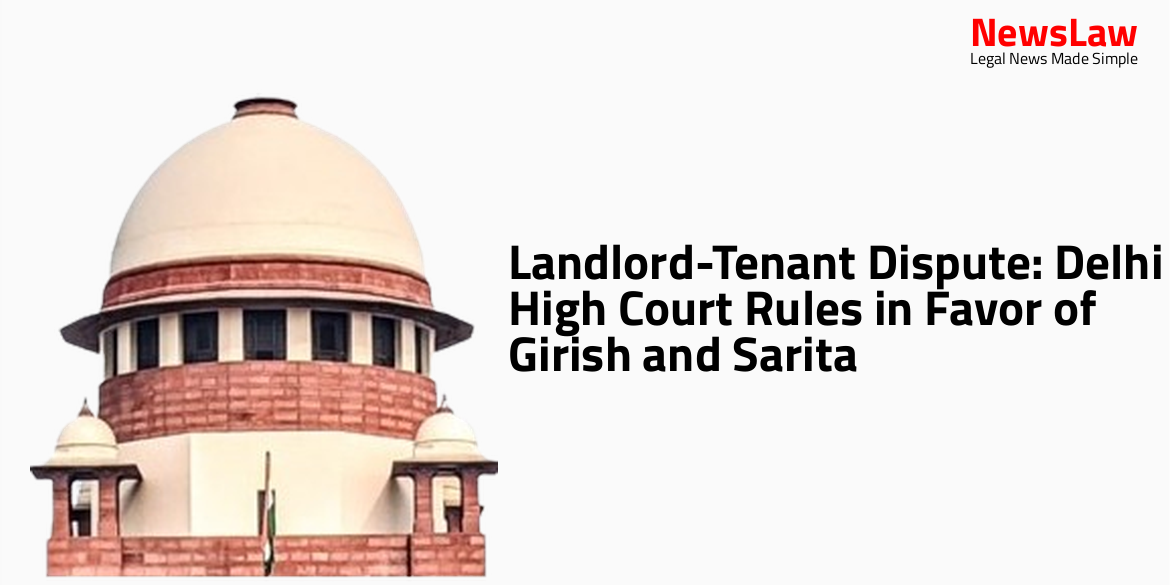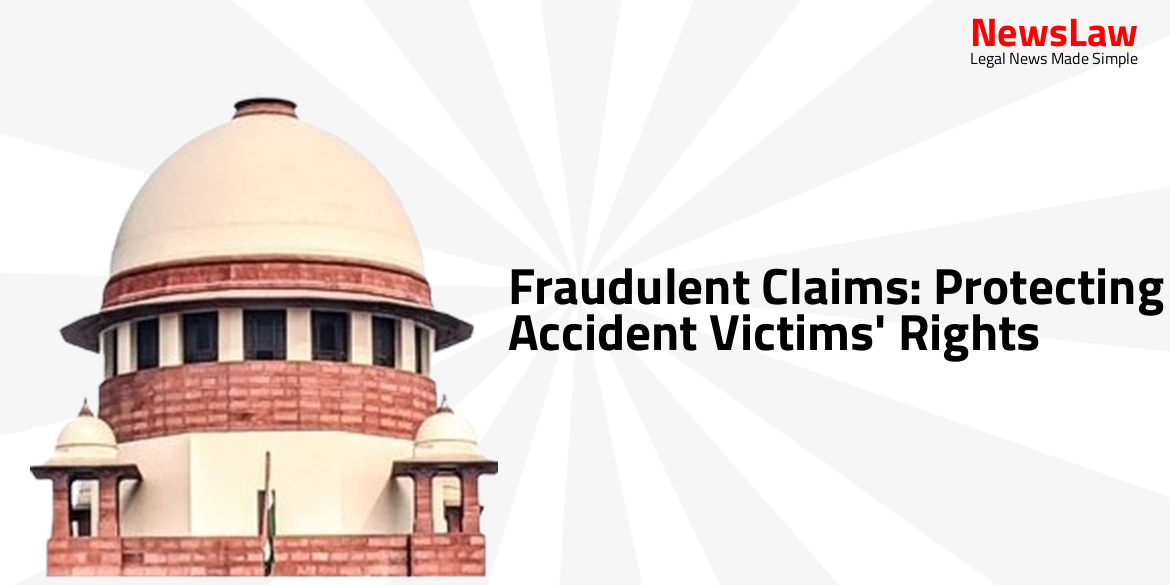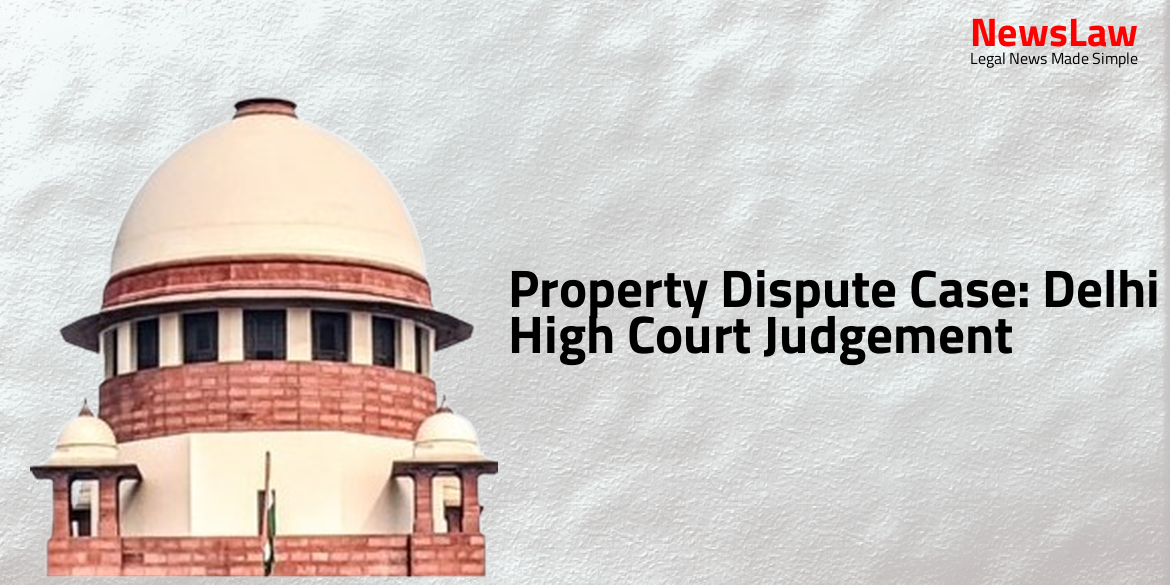In a recent legal battle at the Delhi High Court, a judgment was passed in favor of Girish and Sarita in a contentious landlord-tenant dispute. The court’s decision holds implications for property rights and tenant protection. Stay updated on the details of this case and its impact on property laws in the region.
Facts
- The respondents have two sons who are students at Bal Bharti Public School in New Delhi.
- The respondents and their children currently reside in a rented accommodation at the third floor of property F-444 in New Rajinder Nagar, New Delhi.
- They are desirous of moving to their own house for convenience and cost-effectiveness.
- The tenanted premises were originally leased for commercial purposes and currently house a car accessory business run by the petitioners.
- Mr. Om Prakash, husband of petitioner Nirmala Kumari and father of petitioners Sushil Talwar, Rajesh Talwar, Rakesh Talwar, Deepak Talwar, Kiran Wadhawan, and Indu Chatkara, was the initial tenant. After his passing, the petitioners and their family members occupied the premises.
- The respondents are facing the need to vacate their current residence due to a possession suit filed by their landlord.
- A notice of the Eviction Petition was served to all petitioners, and an application seeking leave to defend was filed.
- The petitioners argue that there is no landlord-tenant relationship with the respondents.
Arguments
- The suit filed by Ms. Pooja Mehta against respondent Surender Kakar is deemed collusive.
- The alleged bona fide requirement of the respondents is considered a sham.
- Rent agreement for property F-444 shows rent at Rs.11,000 per month with lift maintenance charges, indicating the existence of a lift.
- Mother of the defendant passed away, leaving the petitioner as the sole legal heir.
- Dispute over landlord-tenant relationship due to Eviction Petition claiming different landlord.
- Petitioners did not pay rent to the respondents, casting doubt on the attornment.
- Contradictions in the description of the tenanted premises, alleged to be a shop.
- Inconsistencies in respondent’s statements regarding family visitations and property ownership.
- Eviction orders for shops previously tenanted by others cast doubt on the respondents’ claim.
- Financial transactions between Ms. Pooja Mehta and respondent contradict reasons for eviction.
- Failure of respondents to occupy the vacant premises despite claims of need.
- Legal precedents cited in support of challenging the respondents’ claims.
- Allegations of dishonesty and non-disclosure by the respondents in court proceedings.
- The respondents, Girish and Sarita, have acute love and affection for Girish’s married sisters and their respective family members.
- The respondents wish to live in their own house instead of rented accommodation.
- They were forcefully evicted from their previous residence and had to temporarily stay in a hotel with their children.
- The premises vacated by the previous tenant, Mr. Rajender Aggarwal, is considered unsafe for habitation due to its age and structural integrity.
- The respondents require suitable accommodation for themselves, their children, and regular visiting family members.
- The current rented accommodation is inadequate for their needs, which include separate rooms for their children, a guestroom, study room, consultancy room, teaching room, gym, etc.
- The respondents took on rent another premises after being evicted from the previous one, but still, require their own property for comfortable living.
Analysis
- The court emphasized that the landlord-tenant relationship is established based on the attornment given by the previous landlord and the acknowledgment made by the tenant in legal documents.
- The court concluded that the landlords have demonstrated a genuine need for the tenanted property for residential purposes.
- It was noted that the sale deeds presented as evidence showed that the petitioners had sold multiple properties, indicating they were no longer the owners of those properties.
- The court supported the decision of the learned ARC in recognizing the landlords’ superior title and the validity of their claim for eviction.
- The court highlighted that the purpose for which the tenanted premises were initially leased out is irrelevant, and the current usage for residential purposes is justified.
- The court rejected the argument challenging the eviction based on the existence of a lift in the property, stating it did not affect the landlords’ bona fide need for the property.
- The court upheld the landlords’ right to seek possession for residential use, emphasizing that the burden is on the tenant to prove any alleged collusive actions in previous legal disputes.
- The court agreed with the learned ARC’s assessment that non-mention of certain details in legal proceedings does not undermine the landlords’ claim to the property.
- The court acknowledged the changing circumstances of the landlords and their need for the tenanted property, ultimately supporting their eviction petition.
- The court highlighted the limited scope of the court’s interference and the importance of honoring the landlords’ legitimate need for the property.
- The Court observed that the tenant cannot question the title of the landlord and the Rent Controller is not required to adjudicate intricate questions of title.
- The landlord only needs to establish that he is more than a mere tenant to pursue eviction.
- The Court must presume the bona fide requirement of the landlord, which should not be whimsical or fanciful.
- The principle of estoppel arising from the contract of tenancy prevents the tenant from disputing the title of the landlord.
- The landlord’s need is to be presumed as bona fide, and the Court should not dictate how the landlord should utilize his property.
- It is settled law that the Court must presume the requirement of the landlord to be bona fide.
- Section 116 of the Evidence Act restricts a tenant from questioning the title of the landlord at the time of settlement.
- The purpose for which the tenanted premises was let out is irrelevant as per a decision of the Hon’ble Supreme Court.
- The Court noted that the lift in the landlord’s initial rented accommodation does not invalidate the assertion of needing the tenanted premises due to difficulty in climbing stairs.
- The landlord’s judgement regarding his requirement holds paramount importance and cannot be restricted.
- The judgments relied upon by the petitioners are deemed unreliable for the present case.
- The learned ARC rightfully dismissed the leave to defend application, considering settled law and case facts.
- Previous judgments such as Pasupuleti Venkateswarlu, Hasmat Rai, and Punjab Stainless Steel House are not pertinent as subsequent facts have been taken into account.
Decision
- Additional Rent Controller-I, Central District, Tis Hazari Courts, 2269-70 and 2281, Naiwala, Laxmi Rani Dwar Marg, Karol Bagh, New Delhi ruled in favor of the respondents.
- The decision was upheld by the court in the case brought forth by the petitioners.
- The decision favored the respondents and went against the petitioners.
Case Title: NIRMALA KUMARI & ORS Vs. GIRISH KAKKAR & ANR (2024:DHC:4041)
Case Number: RC.REV.-156/2018



